Marilou Diaz-Abaya: Mentor, Sister, Friend
/Acclaimed filmmaker Marilou Diaz-Abaya
UPDATE 4/28/14: From May 1–31, 2014, “Marilou Diaz-Abaya: Filmmaker on a Voyage,” A Film By Mona Lisa Yuchengco, is available nationwide in the U.S. on Comcast’s On-Demand!
This documentary on one of the Philippines’ finest directors, Marilou Diaz-Abaya (Karnal, Brutal, Sa Pusod ng Dagat, Jose Rizal and Muro Ami), is now available to digital cable customers for the whole month of May on Comcast’s Cinema Asian America, which features Asian American films and videos in a monthly, thematically-programmed format.
To access Comcast’s On Demand: Through your Comcast digital cable menu, click on the “On Demand” button. In the “Movies” folder, there will be a “Movie Collections” folder. You will find “Cinema Asian America,” and access “Marilou Diaz-Abaya: Filmmaker on a Voyage.” –Ed.
Most of the viewers had heard of Marilou and even seen some of her movies, but hardly anyone knew her up close. The privileged handful who had worked with the famous director could not match Lisa’s closeness with her subject.
Marilou and Lisa were connected by marriage, but more than that, they were kindred spirits, sisters by choice, and friends in the truest sense of the word. In the last few years, they even became teacher and student, with Marilou giving Lisa a crash course on filmmaking.
After watching the movie, everyone in that audience was awed by the spectacular talent and the inspiring persona of Marilou. So effective and touching was Lisa’s film that people came out feeling they have found a new friend in Marilou, and everyone looked forward to seeing more of her movies.
Lisa broke the sad news about Marilou’s condition at the question-and-answer session after the movie: Marilou was brought to the ICU the previous night and it wasn’t looking good.
The next day, Lisa emailed that the fabulously talented movie and TV director/die-hard scuba diver/thought leader Marilou Diaz-Abaya had passed away at 57.
Not surprisingly, Lisa was flying to Manila a few days later to attend to family matters. The timing was hardly serendipity: Marilou, ever the director, had earlier planned the details of the funeral herself and had chosen Lisa to give the eulogy. –GN
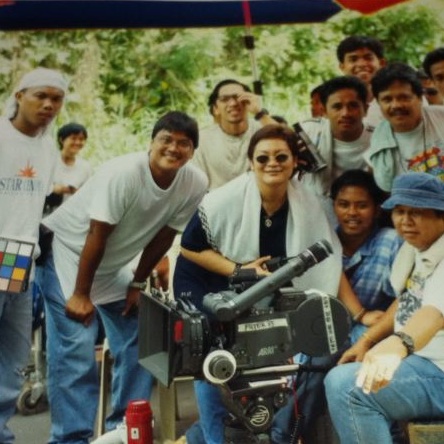
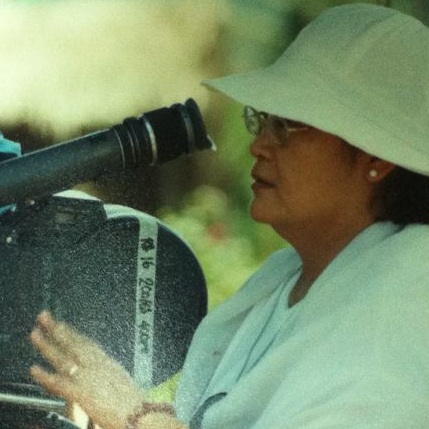
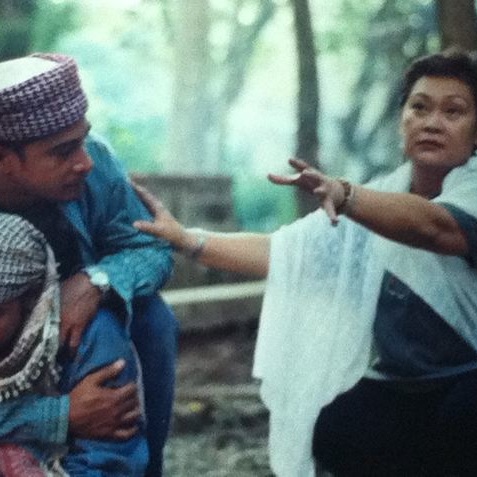
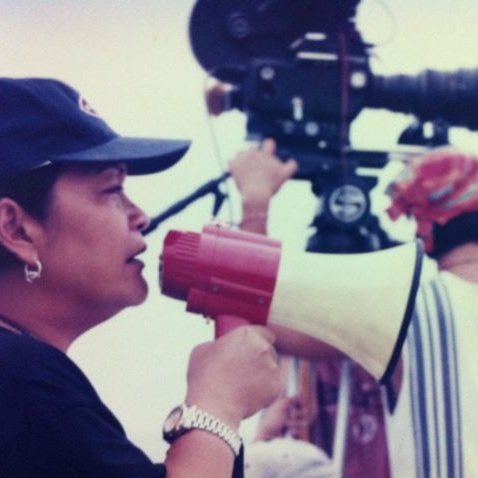
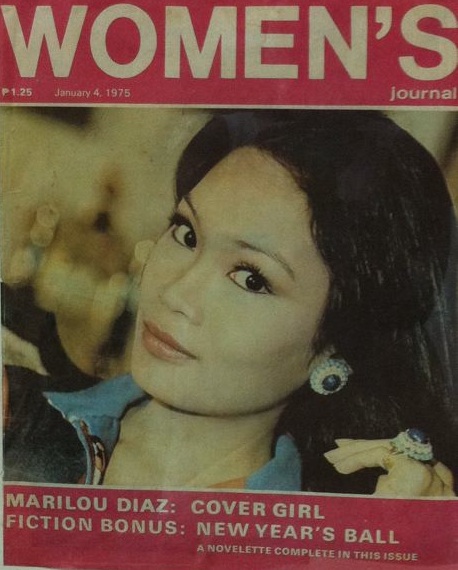
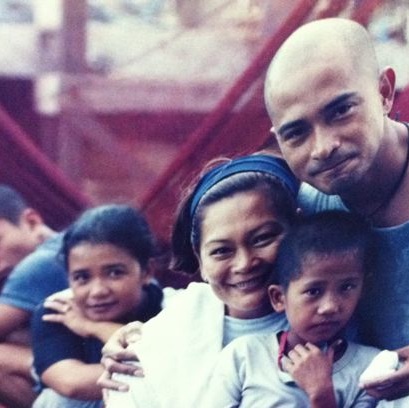
Eulogy for Marilou Diaz-Abaya delivered on Friday, October 12, 2013 at the necrological services at the Ateneo Chapel, Manila.
I am at a loss. Even if I knew this day would come, I had always hoped and prayed that God would make an exception with Marilou, considering how close she was to Him. When I was here last in August, Marilou asked me when I was returning. I told her that October was a possibility because I would be working on a project; but if it did not push through, then I would definitely be here in February for my father’s 90th birthday. She said to me, “February might be too late. I may not be around anymore.” She already knew then that the end was near.
Marilou had planned the details of her death since last year. She wanted to spare her family of making the hard decisions, and she wanted to spend quality time with them while she was still alive. She told me then that Randy David and I would deliver the eulogies. I thought she was kidding. When she died a few days ago, I was still hoping that it was a joke, but Marissa, her sister, confirmed that I was indeed one of the speakers. “I have it in hard copy,” Marissa texted.
My name is Mona Lisa Yuchengco, and for those who are wondering why I have been chosen to deliver Marilou’s eulogy, let me explain my relationship with her. I am Marilou’s sister-in-law. Her husband Manolo and my ex-husband Raffie are brothers. I got the oldest among the brothers, and she got the youngest. We were both the outsiders in the Abaya family, but since we went to the same school, we kind of understood each other.
I visited Marilou one year, while she was still single and studying at Loyola University. That was the first time I realized that this girl could TALK! I don’t recall having any sleep that first night. The next day we drove to Las Vegas for some fun. Everywhere we went, people asked if we were sisters because we looked alike. It was the first time I really got to know Marilou, and I couldn’t help but think how lucky Manolo was to have found such a gem.
Marilou Diaz-Abaya at the "Muro Ami" set
Marilou and Manolo were absent at most of the family dinners because they were always on location, shooting, and when they did show up, we would be regaled with so many stories about the film they were working on and all the gossip on the movie stars. There was never a dull moment.
When my own marriage fell apart, I moved to San Francisco in 1982 with my children and hardly had any contact with the Abaya family, except for Marilou. She visited San Francisco with her family and when I came home to Manila I would call her. During one of those get-togethers, she invited me and Mely, our other sister-in-law, to her house in Tagaytay where we spent the whole day eating, laughing, sharing stories about our children and gabbing away about anything under the sun. The three of us talked at the same time.
When I was going through my civil annulment, I asked Marilou for help. My lawyer thought it would help my case if I had somebody from the Abaya side to testify on my behalf. (By the way, before I get kicked out of this podium or get excommunicated, I want to say that I also had my church annulment!) Marilou agreed to do it without any hesitation. The prosecutor questioned her for 45 minutes, and just when she was about to step down, he asked her if the story of her then-current movie, “Ipaglaban Mo” was based on my case! Then the court clerks asked for her autograph. She said to me, “If I had known how interested they were in my movie, I would have come with movie passes, and then would have saved the prosecutor and myself some time!” So I owe her my freedom.
“Marilou said, ‘You have to care about the people whose stories you are telling on the big screen, and you have to care about the people who will watch your film.’”
In 2009 my older son Paolo was expecting his first child. I know how important this experience is for first time fathers so I came to Manila to lend support. I contacted Marilou before coming home to say that I would be in Manila for two months and wondered if she could teach me how to make movies. I told her that ever since I had sold Filipinas Magazine in 2005 I have missed telling stories. She created a special curriculum for me as classes in her school had already started. A week before we were to start, she told me that the breast cancer she had been diagnosed with in 2007 had returned, and this time she would need a mastectomy. I told her that we could do the classes another time, but she insisted that we go ahead. She said to me, “I will be gone only for two weeks and during that time, another teacher will take my place. Don’t worry.” And sure enough, that is what happened. It was the first time I saw firsthand the dedication and commitment she had for her craft and her generosity in wanting to share this with others.
A year later, I was excited to work on my first full-length documentary. I told Marilou that I wanted to do a film on the controversial family planning bill. We discussed the movie project and she gave me a lot of reading materials from all different perspectives. She also recommended people I should work with. (Again, before you kick me out or excommunicate me, this movie project didn’t go through; but let me tell you the story first.) I came back to Manila in January of 2011, ready to start filming and that was when Marilou was diagnosed with stage-four cancer: it had metastasized to her liver, abdomen and spine. We were all in disbelief and shock.
Marilou Diaz-Abaya directing Cesar Montano and Amy Austria in "Muro Ami"
It dawned on me to ask her if there were any films on her life. She said she didn’t like the idea of others making money on her, but she added, “If it is you, I approve.” She also said that she had wanted to just sit in front of a camera and talk for as long as she could because there was so much more she wanted to impart and didn’t want to leave without doing so. I agreed to be her medium.
It was a very difficult challenge, one that left doubts in my mind about my sanity. Was this student capable of telling the story of the master? Marilou was starting her chemotherapy sessions and we had to work around that. We were only able to interview and tape her for one and a half days. We were not permitted to follow her around. We had a difficult time scheduling the interviews and finding copies of her films. She didn’t keep copies, and the school only had the more recent ones. I could not access her as readily for advice because I knew the chemo treatments left her tired, anxious and nauseated. We didn’t know when she would succumb to the disease. When she was first diagnosed with stage-four cancer, there was talk that she would be around for only two months. Then she hung on for another two months and another. I wanted to finish the film so she could see it before anything happened to her. After seven months in Manila, the first draft of the film entitled, “Marilou Diaz-Abaya: Filmmaker on a Voyage,” had been edited and was on its way for musical scoring. Unbeknownst to me, Marilou had intercepted the film before it reached scoring and I was surprised to receive a text message from her that said, “Bravo, Lisa. Just watched your director’s cut. It’s wonderful. Congrats. Thank you so very much for such a marvelous gift.” With those words, I let out the biggest sigh, and said, “If she likes it, that’s all that matters.” We showed the film in September during a lull from her chemo treatments. About 200 people showed up and gave her a standing ovation.
It was during those months while preparing and filming the movie that I got to know Marilou even more. It was like having another semester of classes. The learning didn’t stop. I accompanied her to a few of her chemo sessions and visited her in the hospital when she had to stay overnight. Every time we were together, it was non-stop talking and non-stop eating, with Marilou doing more of the talking and the eating. Man, could she EAT, too! It was difficult for her to avoid her favorite foods while she was having treatments.
Marilou was a perfectionist in everything she did, and she had high expectations of the people she worked with. She was very nurturing and considered all her students as her anak. Marco, her biological son, acknowledges that his mom had so many anak sa labas (illegitimate children). She was very intelligent, but she did not mock mediocrity. There was no subject she didn’t know or did not have an opinion on. She was fair with everyone and treated all with respect. She always knew the right thing to do and so confident that she was unfazed by criticisms, unkind words, or deeds.
But she was, of course, human. I was with her when she had her down days, when she was hurt or hurting, when she didn’t feel right; but she would only allow herself to dwell on it momentarily, and then the feisty Marilou would be back.
Marilou Diaz-Abaya and her favorite actor, Cesar Montano
In preparation for the filming of the movie, I had prepared five pages of questions I wanted to ask her, some personal questions and some connected to her profession. She patiently, diligently and honestly answered these. Some answers are those exchanged only between sisters, but I’d like to share with you today some of her responses that were not included in the film.
Marilou said that the six years in television from 1986 to 1992 were some of the happiest years for her as a wife and mother because she had not known what it was like to have a regular rhythm in lifestyle. But when she did her comeback film, “Kung Ako’y Iiwan Mo” in 1992, after calling the first shot, she went to the bathroom and had a good cry because she suddenly realized that she had been suppressing her love for films, for which work in television could not be a substitute.
I asked her how she managed in a field dominated by men. She replied, “The discrimination never presented itself on the set or in the professional environment, but it always somehow insinuated itself among critics, movie reviewers and audiences. For example, when I made “Brutal” and “Karnal,” people would say, ‘We love your film. It was good and powerful. It didn’t feel like a woman directed it.’”
I asked her who her favorite actors were. “Alive it would be Cesar Montano,” she said. Among those who had passed, she mentioned Vic Silayan, Jay Ilagan, Dindo Fernando and Charito Solis. She said they were all not only passionate and dedicated but also very systematic and disciplined like her.
“What does it mean to be a good storyteller?” I asked. She said, “You have to care about the people whose stories you are telling on the big screen, and you have to care about the people who will watch your films. This is imperative and the minimum requirement for the creative and social integrity of a filmmaker. The generosity and kinship with your audiences are very important.”
Marilou Diaz-Abaya directing Gloria Diaz in "Jose Rizal"
I asked her what she considered to be her greatest contribution to Philippine cinema, and she replied, “I think it would be up to the future generations to determine for themselves what my greatest contribution is. Having said that, I would like to think that, together with Director Laurice Guillen, we provided the minority voice, the woman’s vision to male subjects such as violence, exploitation, war, conflict, sex and so forth. There was a mother’s sensibility to our films, and there was a caregiver feeling with the characters on screen that was not the same as the best male director. The searching for love and chances to love and be loved were always in our films somehow."
“Why you,” I asked, referring to being stricken with cancer. Without hesitation, she replied, “Because I am visible and it’s easier to show that it’s possible to die with your dignity intact, to prepare for death deliberately, sensibly, with much sobriety and sensitivity not only for yourself but also for the people who are less prepared than you.”
Marilou’s heart was so big because she loved so much and gave so generously to anyone who came her way. Though it is her body of work that we will remember, it is her giving heart that we will miss. Thank you, Manolo, Marco and David for sharing her with us. She was so proud of you and loved you so much.
Even though today is a tragic and such a sad event, I hope that everyone can hold his or her head high because Marilou would have wanted us to celebrate her remarkable life.
In closing, I’d like to read a poem by David Hawkins.
You can shed tears that she is gone,
Or you can smile because she has lived.
You can close your eyes and pray that she’ll come back,
Or you can open your eyes and see all she’s left.
Your heart can be empty because you can’t see her,
Or you can be full of the love you shared.
You can turn your back on tomorrow and live yesterday,
Or you can be happy for tomorrow because of yesterday.
You can remember her only that she is gone,
Or you can cherish her memory and let it live on.
You can cry and close your mind,
Be empty and turn your back.
Or you can do what she’d want:
Smile, open your eyes, love and go on.
Kindred spirits Marilou and Lisa
The last scene in my movie has Marilou saying, “I am actually excited about being sent. I am spending so much time falling in love with Jesus, how can I not rush into his arms?” Ladies and gentlemen, our sister, Marilou, is now basking in the arms of Jesus. Let’s be happy for her.
I would like to personally thank her for opening up a whole new world for me that I didn’t know existed until I became her student, her sister and her friend. A text message she sent me last September 10, 2011 read, “How thoughtful and gracious of God to have intertwined our lives, making us co-pilgrims and authentic sisters!”
I love you, Marilou.
Thank you.

